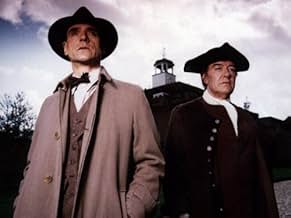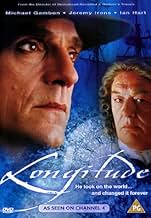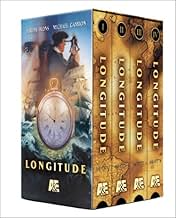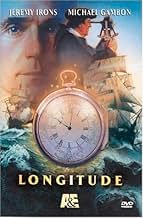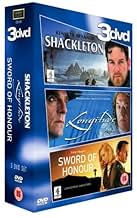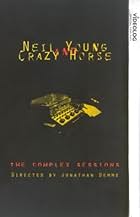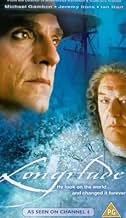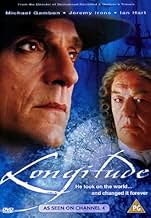Longitude
- Miniserie de TV
- 2000
- 1h 39min
En dos historias paralelas, el relojero John Harrison construye el cronómetro marino para la navegación segura en el mar en el siglo XVIII y el horólogo Rupert Gould se obsesiona con restaur... Leer todoEn dos historias paralelas, el relojero John Harrison construye el cronómetro marino para la navegación segura en el mar en el siglo XVIII y el horólogo Rupert Gould se obsesiona con restaurarlo en el siglo XX.En dos historias paralelas, el relojero John Harrison construye el cronómetro marino para la navegación segura en el mar en el siglo XVIII y el horólogo Rupert Gould se obsesiona con restaurarlo en el siglo XX.
- Ganó 5premios BAFTA
- 7 premios ganados y 5 nominaciones en total
Opiniones destacadas
Logitude is another in a long line of excellent British films that have not received the viewership they deserve. I watched this film on Channel 4 shortly after the new year. And I admit, all the hype over this film in the previous weeks was justified. Accute performances on Gambon's John Harrison as well as Iron's part, of whom mind I must admit I am no fan, plus the usual assortment of marvelous west end stage performers in particular John Wood as Edmund Halley proclaim Longitude as excellent entertainment.
The story was, on the other hand somewhat mellowed down and excessively lengthed. Yet I suppose in order to transpire the scientific details presented in the novel, length was required. But overall it is a great recount of history and I strongly recommend it to American audiences who won't find this sort of thing at home easily.
If you enjoy intelligent movies, then you should definitely seek this film out. It sounds dreadfully boring if you read the plot summary, but it isn't. It is wonderfully written and produced and contains much light humor as well, making it truly entertaining.
One film that it reminded me of is "Master and Commander" because of the similar scenes of the British navy and the theme of the struggle of science and progress in the face of war and politics with intelligence and perseverance winning out in the end.
The interwoven story of Rupert Gould is just as interesting and provides an artistic counterpoint to the main story. Again, we have the story of a man who continues with his work in spite of numerous obstacles of the most serious magnitude because he knows that the world will be a better place as a result of that work.
The film is long and you should wait until you have enough time to sit down and watch it through to the end because once you begin you will have difficulty turning it off.
"Longitude" is a towering achievement as a movie. Shown in 4 hours on A&E network, I taped it to skip the commercials and was able to watch it in just over 3 hours. I only give ratings of "10" to truly remarkable movies, and this is one. It helps to be a scientist, and to have had a life-long fascination with navigation and timepieces.
The story is historical - the British government passed an act in the early 1700s for a prize of 20,000 Pounds for the first to provide an accurate and practical means of establishing longitude at sea. A Board of Longitude,comprising self-important scientists, would judge when the challenge was met.
John Harrison, a carpenter who understood the sun's apparent movement with the Earth's rotation, figured you could do it with a very accurate clock. He, with help from his son William, did it over a period of about 50 years, and met all conditions with his 4th clock, but the board kept throwing up roadblocks to avoid giving the award to someone who was not a scientist but a mere "carpenter." Finally, when Harrison was 80, in the year 1774, was given the prize by Parliament. He died only two years later.
The ancient story was interwoven with a WWII-era story of a man, played by Jeremy Irons, who undertook to restore all of Harrison's old clocks, and finally succeeded against similar resistance that Harrison had faced.
If you either are not a scientist, or do not appreciate the magnitude of Harrison's effort, and its contribution to modern navigation, then it is possible that you would find this movie somewhat boring. Do yourself a favor - don't waste your time. For me, it remains one of the absolute best movies I have ever seen, both in significance of the story and the mastery of the acting and direction.
The performances of the two principals, Michael Gambon and Jeremy Irons were awe inspiring, the excellent supporting cast did not let them down.
What on the surface sounds like a dry story - the search for a means of accurately determining longitude at sea - and the obsession many years later of a returned WW1 soldier with locating and restoring the devices invented for that purpose - was turned into a genuine cliffhanger by the producers. Initially I found the switching from one story to another somewhat disconcerting, but it was done so well that it soon felt quite comfortable.
This is the story of one man's lifelong trial and error search to perfect his devices and to win the prize offered for the solution to the longitude problem. Against all odds and at great damage to his health he and his son eventually succeeded. Interspersed with this is the story of another man centuries later who was determined to locate & restore the devices and to ensure their preservation for future generations.
I can really recommend this show to anyone with an enquiring mind, who enjoys a fascinating story, excellently told.
"Longitude" is filled with tons of edge-of-your-seat, gritty scenes, and every second of the 200-minute film glows with a profound message. The ending scene is especially powerful, in which Rupert Gould remarks, "What makes a man great? A man may be great in his aims, or in his achievements, or in both...but I think that man is truly great who makes the world his debtor..who does something for the world which the world needs, and which nobody before him has done or known how to do."
Definitely a great educational film to watch, and an excellent film to own. "Longitude" is an unforgettable experience and a demonstration of just how good a movie can be.
¿Sabías que…?
- TriviaTo portray the aftermath of the shipwreck in the Isles of Scilly, dozens of extras had to lie in the cold surf, pretending to be dead, for over an hour.
- ErroresDuring the entire movie, when H1 is seen, the ticking that can be heard belongs to H3. The actual H1 and H2 tick in a rather dull way, but H3 is instantly recognizable, which is probably why its sound was used for H1 and H2 too. H4 appears to use the correct sound.
- Citas
Sir Edmund Halley: Don't touch that, boy!
William Harrison: I didn't, sir, honest, I was just looking.
Sir Edmund Halley: Do you know what that is?
William Harrison: To tell the movements of the stars.
Sir Edmund Halley: How do you know that?
William Harrison: It's my job at home.
Sir Edmund Halley: You have one of these at home!?
William Harrison: No, sir, we use Mr. Johnson next door's chimney.
Sir Edmund Halley: And, pray, what is it that you learn from Mr. Johnson next door's chimney?
William Harrison: The time.
Sir Edmund Halley: How can you tell the time with a chimney?
William Harrison: If you stand in the right place, you can see Sirius.
Sir Edmund Halley: Sirius?
William Harrison: It moves behind Mr. Johnso's chimney 3 minutes and 56 seconds earlier every day. We need the time for our timepiece, to tell if it's true.
Sir Edmund Halley: And is it?
William Harrison: It's bloody perfect, sir.
- ConexionesReferenced in 500 días con ella (2009)
Selecciones populares
Detalles
- Tiempo de ejecución1 hora 39 minutos
- Color
- Mezcla de sonido
- Relación de aspecto
- 1.78 : 1
Contribuir a esta página


